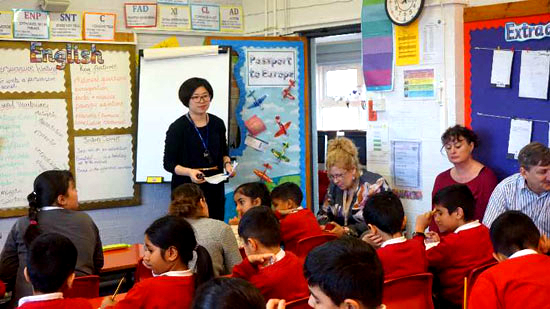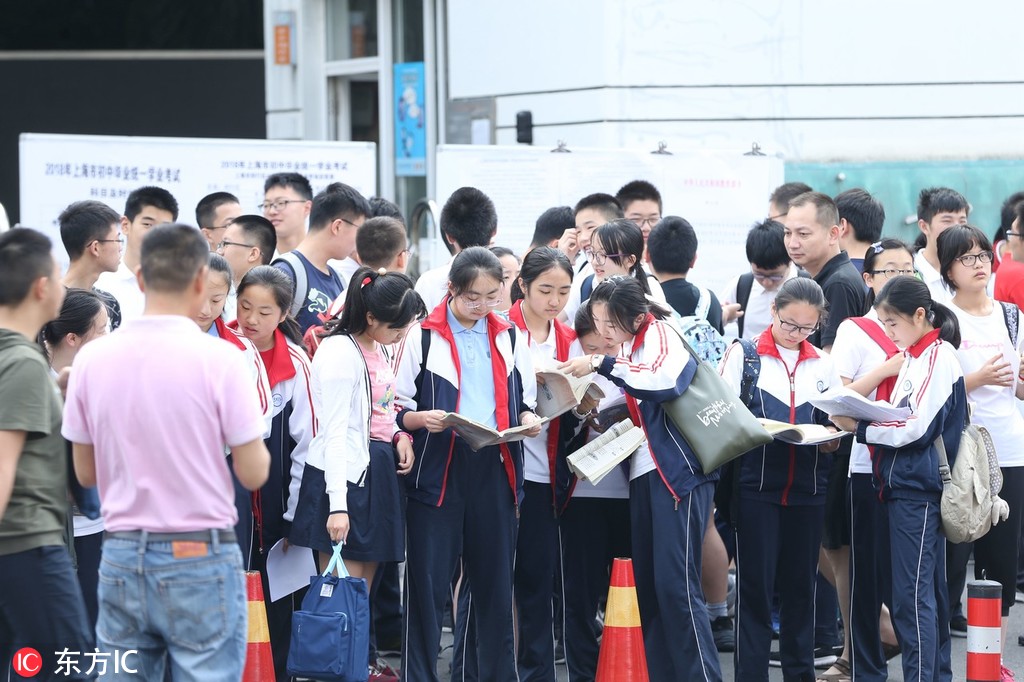
From the People's Daily app.
And this is Story in the Story.
It has been almost four years since Britain started adapting Chinese teaching methods, specifically Shanghai math, in its primary schools and it is producing results.
So far, 5,000 of Britain's 16,000 primary schools have adopted Shanghai methods, and the UK government has committed 41 million pounds ($54 million) to help at least 8,000 schools adopt Shanghai math teaching methods by 2020.
In January, a group of 86 Shanghai math teachers visited more than 40 British schools where they taught students and exchanged ideas with local teachers. The visiting teachers are the latest to participate in a government-led exchange program. It began in 2014 and has more than 700 teachers participating.
A study by Sheffield Hallam University found students in the UK schools who use the Shanghai math method outperformed the national average between 2015 and 2017.
The report found that British teachers valued the exchange as a positive professional development experience and teachers said they gained enhanced subject and teaching knowledge and increased confidence.
Today’s story in the story looks at the positive results Shanghai math methods are having in the UK and the reaction to it by educators.

Zhu Guangqin, a teacher from Shanghai, conducts a lecture at the Parkfield Community School in England. (Photo: Sina)
Shanghai mathematics education takes on a mastery approach and follows the premise that all pupils can succeed as math learners.
Shanghai math teaching methods first attracted widespread public attention when Shanghai topped the Organization for Economic Cooperation and Development's program for international student assessment rankings for students 15 and 16 years old in 2009 and 2012.
The impressive performance came as the UK government considered how to improve British children's math knowledge. The government decided to adopt some Shanghai math techniques for the British curriculum.
Every year since 2014, groups of British and Chinese teachers have visited each other's schools to share expertise and discuss effective methods. When the latest group of Chinese teachers taught in British schools last month, their lessons were observed by dozens of local teachers who were eager to learn the techniques for their own classes.
Debbie Morgan smiles with pride when a previously underperforming British student gives a correct answer in class after learning math the Shanghai way.
"Shanghai math embodies a belief that every child can do well if they are taught well, and that is now leading a mindset change in British schools," said Morgan, who is director for primary schools at Britain's National Centre for Excellence in the Teaching of Mathematics.
Morgan said the impact far exceeds measurable math test results. It has cultivated students' passion and confidence in mathematics. The system's techniques, which include individual, tailored help, has encouraged many students who previously performed poorly to catch up with their peers.
Carol Knights, director for secondary schools at the national math teaching center, said Shanghai math techniques mean younger students have been able to grasp basic knowledge in a more solid way that ensures they understand more complex content when they are older.
"One current issue in the UK is, often, students who do well at math suddenly find themselves struggling at A-level," Knights said. (A-level refers to an exam taken during the last two years of secondary school).
"That is because their foundation is not solid enough, and we believe the Shanghai math methods can effectively address that," she said.
Liu Xiaoming, China's ambassador to the UK, said at a reception at the embassy for the visiting Shanghai teachers that the program has deepened and enriched education partnerships between China and the UK and enhanced mutual understanding between China and the West.
Nick Gibb, Britain's minister of state for schools, said, "The exchange helps to deliver profound and systematic change in our schools, by giving teachers insights into some of the best maths teaching in the world."
Gibb said, "Standards are rising in our schools, with 84 percent of pupils now attending good or outstanding schools compared to 66 percent in 2010. We have looked toward the best education systems in the world to help drive this improvement and our work with China has been a key part of this.

Middle school students in Shanghai, China, on June 16, 2018. (Photo: IC)
"The Shanghai-England Maths Teacher Exchange has been a positive influence on our schools, with the lessons learned from it having demonstrable effects in classrooms. There has, for example, been a marked increase in the number of primary schools using whole class teaching rather than seeing pupils split by attainment."
Afshah Deen, who is a year-2 teacher at Parkland Primary School in Wigston, Leicestershire, took part in the exchange. "Seeing math teaching in Shanghai and observing how lessons are planned and then discussed and refined by teachers there has been the most interesting and rewarding professional experience of my career.
"I've literally questioned everything I've done for the last eight years of teaching. It's really inspired me to be a better math teacher," Deen said.
(Produced by Nancy Yan Xu, Brian Lowe, Lance Crayon, and Chelle Wenqian Zeng. Music by: bensound.com. Text from China Daily, CGTN)


